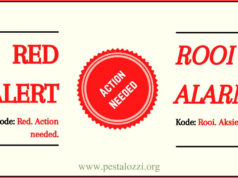
(By Christopher Cordeiro, LearnFree: Guest Author)
The question any new home educators, especially those coming from a school environment ask is “Must I do CAPS”. With the Policy on Home Education having been published and the proposed BELA Bill in the works it is a question many experienced home educators are asking as well. We should have a simple and straightforward answer to this question but as with many aspects of the regulation of home education the answer is not straight-forward.
One problem is that this is like one of those nasty exam questions with a part a) and a part b). The “a)” part is “Must I do CAPS” to be registered and part “b)” is “Will my child be assessed against CAPS standards”. In b) the challenge is to stay registered because if your child “fails” an assessment you may be subject to an enquiry and their registration for home education may be withdrawn.[1]
In the first part of this article, we started a bit of a back to front process and looked, not at whether doing CAPS is a requirement to be registered to home educate with a provincial education department, but rather how your children will be assessed if they are registered.
Now we are going to flip that around and “begin at the very beginning” (which, according to the “Sound of Music”, is a very good place to start) and look at getting registered in the first place. We will then look at how you protect your child’s best interests and right to education.
Those attempting to register can follow one of three routes: either you will be using a CAPS-compliant curriculum, or you will be following an alternative curriculum or approach, or you could de-school first, and then decide on which curriculum or approach to choose.
If you are registering and you are using a CAPS-compliant curriculum, then registration itself should not be too much of a problem, at least as far as curriculum choice goes. In this scenario you will either be using the services of a curriculum provider or be using a do-it-yourself approach.
Registering with a CAPS-compliant curriculum
Registering with a CAPS-compliant curriculum: The curriculum provider route
As you are unlikely to get any queries about your curriculum choice, you need merely to focus on the assessment.
In general, you should check that your curriculum provider is offering a CAPS-compliant curriculum, and that your provider is aware of the latest requirements if there are any changes to how assessment is conducted.
If you have signed up with a curriculum provider and are for some reason or another not going to be able to meet the assessment requirements, you should discuss this with the curriculum provider and obtain their support when registering with the DBE. Also make sure any special arrangements are set out in writing and keep a copy. If you stop using the curriculum provider, you want to be sure that you have a record of any exemptions that were agreed to.
It could also be that you have objections to certain parts of the curriculum (typically certain parts of Life Orientation). In this case you should inform the curriculum provider in writing that your child will not do any assignments or assessments on those parts.
It may be that your curriculum provider must follow their internal systems and is unable to provide you with the flexibility you require. In that case change curriculum providers rather than compromise.
Registering with a CAPS-compliant curriculum: The D-I-Y route
The curriculum and various workbooks are available for free download from the DBE website. It is possible not to use a curriculum provider and still be CAPS-complaint. We are even aware of a few cases where provincial officials have ensured that a department’s subject matter experts assist home educators. However, it is key to ensure that you know how your child will be assessed and to have agreement on how that assessment will take place.
If you register with a CAPS-compliant curriculum and are not using a curriculum provider, you are not likely to encounter many issues when registering but may face a challenge when it comes to the assessment at the end of the year and phase.
You will be using a “competent assessor”, although it may be the case that some curriculum providers will also provide this end of year service. The parent is taking direct responsibility to comply with the assessment requirements. Parents using a curriculum provider are receiving feedback throughout the year, and so if how they are assessing does not meet the DBE’s requirements, they are more likely to have that identified early. In the absence of the continuous feedback, the family may receive a shock at the end of the year should the competent assessor believe they have not met the requirements. This could lead to a very nasty situation where a child has mastered the required skills for the year, but because the child has not completed all the required “work”, the assessor might advise that the child repeats the grade.
It is hoped that leniency and common sense will prevail. It seems likely that the assessment requirements will at first not be strictly enforced, although they may become more stringent as the education departments get more control of the process.
Another possibility is that a child will be registered with a non-CAPS compliant curriculum.
Those using non-CAPS compliant curricula may face two hurdles. The first is getting your child registered using the curriculum you have chosen and the second is being able to meet the assessment requirements.
Registering with a non-CAPS curriculum
The Trust is aware of cases in which home learners using alternative curricula have been registered for home education with provincial education departments. We have assisted members to obtain their registration using these alternative curricula.
A problem is that according to the Policy on Home Education the education programme your child follows must cover “the acquisition of content and skills at least comparable to the relevant national curriculum outcomes as determined by the Minister …”.[2]
The outcomes are contained in the National Curriculum Statement (see the discussion in the first article). The content, concepts and skills that are required are listed in the CAPS documents per subject.
An education official will have to assess if your chosen curriculum covers the same content, concepts, and skills as the CAPS curriculum. In addition, to do this, you will have to cover the same subjects as are covered in CAPS.
The assessment policy of the DBE sets out how many subjects your child should take and what those subjects should be. Your child must be registered for a certain number of minimum subjects per phase. These subjects are the same subjects normally followed at school. See p.14 of the DBE Booklet for the list. There is no subject choice, other than a choice of second language, from Grade R through to Grade 9. As we have mentioned in the first part of this article, the DBE is very happy for your child to take additional subjects, but they must do the required subjects. If a child does all the required CAPS subjects, the average child is likely to find no time to do any other subject that interests them. This contradicts a key aspect of many home education programmes i.e., following the child’s interests. Therefore, this is not a real choice and being “allowed” to do extra subjects is pointless. Furthermore, by forcing a child to master subjects in which the child is not interested, it can harm the child’s love for learning.
It is unlikely, at least at first, that education officials will take the time to assess if your curriculum delivers the same outcomes as CAPS. It is hard to imagine that officials will work through pages and pages of curriculum guidelines to determine the relevant outcomes. They are much more likely to be so happy to have you registering that they will take a lenient approach.
More likely is that they will look at how many subjects your child is taking, as that is easy to check and if they are not taking all the required CAPS subjects, that is where some problems may arise.
A positive is that, after much lobbying and questioning of the constitutionality of enforcing the national curriculum, the DBE has changed the proposed BELA Bill to state that the chosen programme need only predominantly cover the content and skills of the national curriculum.[3] This a significant concession, although it doesn’t go far enough and doesn’t grant full freedom of curriculum choice. The BELA Bill is not law yet and this provision hasn’t come into force. However, as the DBE has conceded this, it is unlikely that officials will enforce the stricter prescriptions of the Policy. Also, as the Policy is merely a policy and must be flexibly implemented, officials can of course use their discretion and follow the more generous provisions of the BELA Bill even if it is not law yet.
A child following a non-CAPS curriculum will be assessed against the standards of the National Curriculum Statement. It is important to review part 1 of this article that sets out the three aspects of assessment i.e. What will be assessed? How many subjects must be taken? And how will the assessment be conducted?
This could present a problem, as these children will not have necessarily acquired the skills and concepts or know the content required by CAPS. These learners may learn this content and acquire these skills at a different time and in a different order. They may have no knowledge of some areas but an in-depth knowledge of others.
The approach and attitude of the “competent assessor” will be crucial.
Not using a CAPS-compliant curriculum poses some serious challenges but what happens if your home education programme is not primarily curriculum based.
But I don’t use a curriculum
If your home education programme follows an alternative approach, such as eclectic, Charlotte Mason or self-directed learning, and you don’t use any curriculum or use a curriculum or different curricula as a resource rather than the way in which you order learning, you may struggle to get your child registered. It is likely going to take quite a bit more interaction with an education department.
The key thing to remember is that you have two issues to address a) getting agreement that your programme is acceptable, essentially an exemption from the requirement to meet the contents and skill (and concept) requirements of CAPS, and b) when being assessed, an exemption from the requirements of the National Curriculum Statement.
We are not aware of anyone who has attempted to register who follows a natural/self-directed or unschooling approach and who was successful. If you have succeeded or know of someone who has, we would like to hear from you.
Getting practical
Given these challenges we are now ready to deal with the more practical side of the question, which is how you protect your and your child’s rights.
It is best to do this at the moment of registration. This can seem quite daunting but remember that the registration requirements are merely policies and policies are not laws. They mustn’t be rigidly enforced; these requirements should be negotiable.
Protecting your Child’s Best Interests
An important principle is to not change what is working for your child to jump through irrational hoops that make things easy for officials. Officials should tailor their requirements to what works. A key concept to keep in mind is that you must ensure that the best interests of your child are served. If you begin to compromise this on a “go-along to get-along” basis then you weaken your ability to get the officials to be flexible. Alongside the principle of not compromising your child’s best interests you will need someone to support you. The Trust is in a position to assist you; contact the Trust prior to registering so you can get the support you need.
Complete your forms in full
You can protect your child’s best interests by completing your registration forms in full and describing exactly what curriculum or approach you are following. It is better to have this all stated upfront and negotiate any difficulties then, than to deal with misunderstandings with the education departments later. If any information on your form has been misrepresented, the education department must withdraw your child’s registration. [4]
Ensure you are aware of all the requirements
One of the conditions that the DBE imposes is that home educators must understand home education and takes full responsibility for implementing home education. [5]
When you submit your registration forms you will be required to sign the following declaration:
“I (name of parent/guardian) hereby declare that I have read section 3(1) and 51 of the South African Schools Act, 1996 together with the Policy on Home Education. I further declare that I understand and accept the responsibility to provide, monitor and assess the home education of my child and that I have supplied full and correct information.”
Do not sign this until you are confident you understand all the aspects of your responsibilities.
Summary
Home educators who are trying to register with the provincial education departments can find themselves in one of the following positions:
1. Following a CAPS-compliant curriculum and using a curriculum provider. Here you should confirm that your provider is up to date with all the latest requirements and changes. Also be aware that the assessment methods can get stricter over time. The Trust is aware of a certain provider complaining that parents mark their children’s work too leniently and that the parent-assessed marks differ from the provider-assessed marks. If that becomes a trend over time, the DBE may not allow parents to assess their own children.
2. Following a CAPS-compliant curriculum and using a DIY approach. In this case you should be sure you are aware of all the assessment requirements. If you want to deviate from these, discuss this with the education department and make sure you have a record on any concessions in writing.
3. Using a non-CAPS-compliant curriculum. In this case you will need both to have your curriculum accepted and to agree how your child will be assessed.
4. Not using a curriculum. If you are not using a curriculum, then the challenges are like those if you are using a non-CAPS compliant curriculum. However, you may encounter more difficulties than a family that uses a curriculum.
The CAPS outcomes can also be a moving target, albeit a slow one, and so it is very important to keep track of what changes are being made. For example, currently there is a move afoot to introduce a third language. Curriculum providers should keep you abreast of the changes, but if you are using other approaches you will have to keep aware of the changes.
If your child “fails” the assessment you can appeal any steps taken against your child. Trust members should contact the Trust immediately if this happens, so they can receive all the support they require.
To avoid this situation it is vital to agree with the education department officials how your child will be assessed when you submit your registration form.
The bottom line with assessment is to ensure that the department agrees to your assessment methodology, that that agreement is recorded in writing and that you have support if your run into trouble.
Please be sure you know your rights as a citizen. If you are in any way concerned that your children’s rights may be infringed when registering, we strongly suggest you consult your attorney for assistance. If you are a member of the Trust, you may contact the Trust.
If you are not a member of the Trust we advise that, should you not wish to use your own attorney, that you join the Trust before you are involved in a conflict situation with an official, the Provincial Education Department or the DBE.
[Please
Note: Any legal information contained herein is intended for general
informational purposes only. It is not a substitute for legal advice from an
attorney licensed to practice in your jurisdiction with knowledge of your
specific legal issue, and you should not rely upon such legal information. Members of the Pestalozzi Trust are advised
to contact the Trust, who will assist you and where necessary and appropriate,
place you in contact with a registered member of the legal profession. A
reminder that the legal costs of Trust members are covered by the Trust.]
[1] Clause 18(6)(2) “A report from a competent assessor which shows that a learner has not met the minimum outcomes and standards at the end of the phase assessed by the competent assessor may provide grounds for a review of a learner’s registration for home education …” Policy on Home Education 2018.
[2] Clause 13(1)(b)(ii) Policy on Home Education 2018.
[3] Clause 35 s51(2)(b)(iii) “…the proposed home education programme is suitable for the learner’s age, grade level and ability and predominantly covers the acquisition of content and skills at least comparable to the relevant national curriculum determined by the Minister …” Basic Education Laws Amendment Bill (BELA Bill) 2017.
[4] Clause 24(2) “The HOD must withdraw a learner’s registration for home education if, after enquiry, the HOD is satisfied that: (a) information contained in the application for registration has been misrepresented …” Policy on Home Education 2018.
[5] Clause 13 (1)(a) “… the parent understands home education, accepts full responsibility for the implementation of home education for her or his child; …” Policy on Home Education 2018





